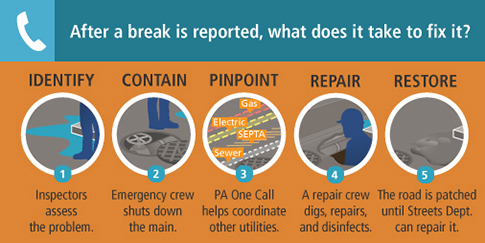
If you’ve been listening to the radio or watching TV news any morning over the last couple months, you’ve undoubtedly heard several reports about broken water mains all over the region. Though we’ve been able to dodge the snowfall that has made life very difficult in other cities, the extreme swings in temperature have done a number on our pipes.
During a mild winter, when the temperature outside only occasionally dips below 32 degrees, the temperature of the ground below tends to remain at a constant, slightly warmer temperature. As a result, we tend to see fewer wintertime water main breaks.
During a winter like this, with air temperatures dropping into the low single digits and staying there for days, the water in the mains gets colder and denser and the traces of water in the ground freeze and expand. The cold, dense water flowing through the pipe causes the pipe material to contract at the same time the expanding ground around the pipes pushes and pulls them in all directions. It’s a recipe for broken joints, which we’ve seen plenty of!
Each broken main has the potential to make a real mess as water coming to the surface quickly freezes over and service to homes and business is disrupted. Into these breaches, go our cold weather warriors. These repair crews are tasked with identifying the leak, shutting off the water going to the broken section of pipe (made complicated by frozen valves), pinpointing the exact location of the break (often the hardest part!), digging up the frozen ground around the break to repair it, and quickly patching the street to return life to normal. And they do this in ideally less than eight hours, usually while working in sub-freezing temperatures… with water flowing all around… in the dark!
So what can you do to help?
PWD monitors 3,200 miles of water mains and has crews all over the city inspecting and maintaining the water and sewer system to find and repair leaks before they become bigger problems. But we need you, citizen of Philadelphia, to help out by acting as another set of eyes and ears. When you see any water that looks like it’s in the wrong place, get in touch with us to report it.
The good news is we have a bunch of ways to do so. The way to reach us directly is by calling (215) 685-6300. Granted, when the water starts flowing down your street at 5am you’re not likely to have this blog post handy so you can also call 3-1-1 and ask to be transferred to report any water or sewer emergency. Finally, if the phone isn’t your bag, you can get in touch with us directly through Twitter (we read all of the Tweets directed toward us and respond as quickly as we can). Follow us at twitter.com/PhillyH2O.
Oh, and please… feel free to let that crew who is out there in the cold, getting wet and trying to fix that break as quickly as possible, know that you appreciate the tough job they’re doing. The rest of us here at PWD certainly do!